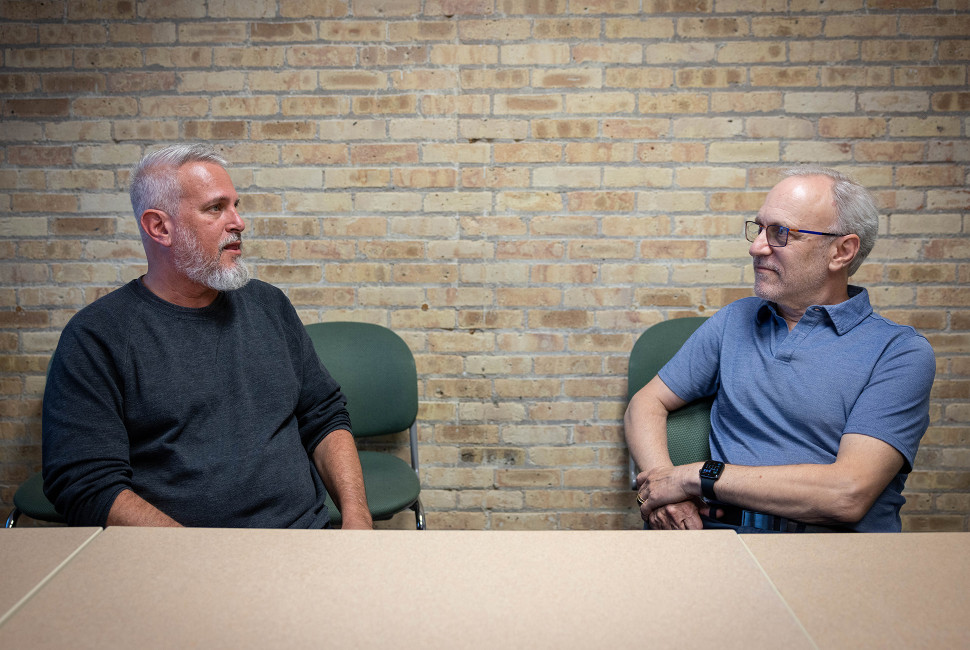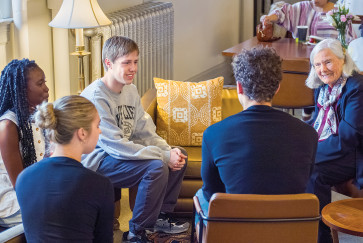Yair Bar-Haim grew up in a region where civilians are exposed to acts of war and aggression on a regular basis and where national military service is mandatory.
Bar-Haim’s interest in clinical psychology and the treatment of patients with post-traumatic stress disorder (PTSD), which is the focus of his life’s work and that of the newly created National Center for Traumatic Stress and Resilience at Tel Aviv University, stemmed from his personal exposure to trauma as a soldier as well as his experience as the father of three children, who also completed their mandatory military service in Israel.
“My time in the service taught me how deeply trauma can shape a life, and that insight continues to guide my science and clinical work every day,” said Bar-Haim, the center’s director, who is teaching and conducting research at Northwestern this year as a visiting professor in the psychology department.
PTSD is a common psychological disorder arising from exposure to trauma, and one that is significantly more difficult to treat, particularly in veterans, than other common disorders such as anxiety and depression. Research suggests military and veteran populations experience more modest treatment outcomes than civilians, with approximately two-thirds requiring additional forms of treatment.
Bar-Haim seeks to close this gap by improving treatment for PTSD patients, starting with the new center’s patients, many of whom are combat veterans whose sustained exposure to trauma puts them at higher risk of developing PTSD.
Because nightmares and insomnia are a significant problem for patients with PTSD, Bar-Haim has followed the work of Northwestern faculty including Rick Zinbarg, who specializes in the treatment and study of anxiety, panic and depression, and Ken Paller, whose lab developed methods for influencing dreams content while avoiding sleep disruption.
He embraces the opportunity as a visiting professor to partner with his Northwestern colleagues and explore potential research collaborations.
“The problem of PTSD is a global one, and I am looking for partners at Northwestern and in Chicago to collaborate on research that will move the issue forward,” Bar-Haim said.
Bar-Haim’s visiting professorship is sponsored by the Israel Innovation Project, whose goals include deepening and expanding academic and scientific partnerships between Northwestern and Israeli institutions of higher learning. This quarter Bar Haim is teaching a course on trauma and recovery that views trauma through the lenses of psychology, neuroscience and clinical practice to understand its effects on memory, emotion and behavior, as well as current approaches to treatment.
“I hope students come away with a solid grasp of both the science and the human side of trauma, and with an appreciation for how research and clinical insight inform each other,” Bar-Haim said. “Northwestern students are exceptionally engaged, thoughtful and curious, which makes every class lively and rewarding.”
“Yair’s interdisciplinary work has made a profound impact globally both in academia and in real-world settings. His visit represents another phase in IIP’s efforts to strengthen academic collaborations with Tel Aviv University and other Israeli universities in research, joint conferences and the exchange of faculty and students,” said Elie Rekhess, Crown Visiting Professor in Israel Studies and director of the Israel Innovation Project. “His expertise will greatly enrich the educational missions of both IIP and the department of Psychology, strengthening Northwestern’s leadership in mental health research and translational science.”
Bar-Haim’s research has focused on preventing combat related post-traumatic stress disorder.
“This research shows using science-based psychology interventions to build resilience before deployment can help lower the risk of PTSD in soldiers. But their modest impact means they should be used as part of a larger plan to build resilience, not as a stand-alone,” Bar-Haim said.
A large-scale follow-up study, funded by the U.S. National Institute of Health and Department of War, will soon be published by the American Journal of Psychiatry.
The Israel Innovation Project will host a public lecture by Bar-Haim on Monday, Nov. 3 at 5 p.m. at Norris University Center. Register online here.
Additionally, the department of psychology will host a colloquium by Bar-Haim on Friday, Nov. 14 at 3:15 p.m. in Swift Hall, 107 in which he will discuss the scientific journey from idea, to testing, to large-scale replicability. More information is available on the Planit Purple website.


